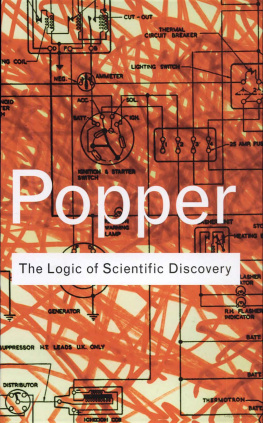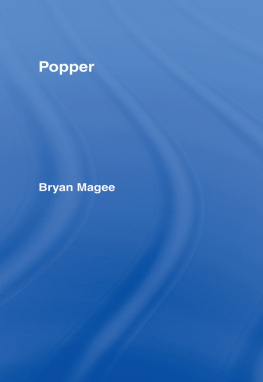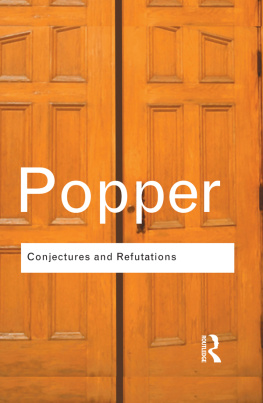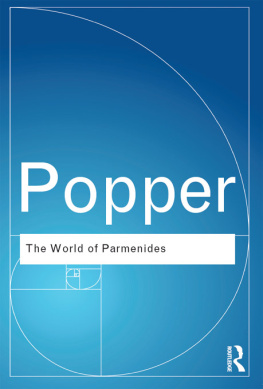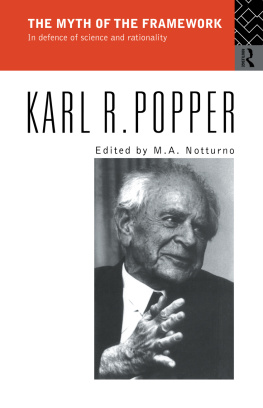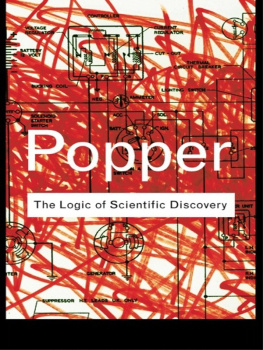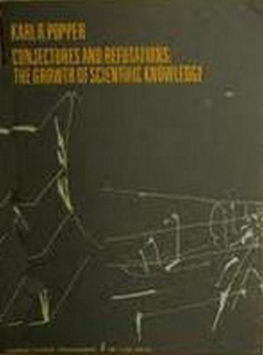Popper - The Logic of Scientific Discovery
Here you can read online Popper - The Logic of Scientific Discovery full text of the book (entire story) in english for free. Download pdf and epub, get meaning, cover and reviews about this ebook. year: 2011, publisher: Taylor and Francis, genre: Religion. Description of the work, (preface) as well as reviews are available. Best literature library LitArk.com created for fans of good reading and offers a wide selection of genres:
Romance novel
Science fiction
Adventure
Detective
Science
History
Home and family
Prose
Art
Politics
Computer
Non-fiction
Religion
Business
Children
Humor
Choose a favorite category and find really read worthwhile books. Enjoy immersion in the world of imagination, feel the emotions of the characters or learn something new for yourself, make an fascinating discovery.
The Logic of Scientific Discovery: summary, description and annotation
We offer to read an annotation, description, summary or preface (depends on what the author of the book "The Logic of Scientific Discovery" wrote himself). If you haven't found the necessary information about the book — write in the comments, we will try to find it.
Popper: author's other books
Who wrote The Logic of Scientific Discovery? Find out the surname, the name of the author of the book and a list of all author's works by series.
The Logic of Scientific Discovery — read online for free the complete book (whole text) full work
Below is the text of the book, divided by pages. System saving the place of the last page read, allows you to conveniently read the book "The Logic of Scientific Discovery" online for free, without having to search again every time where you left off. Put a bookmark, and you can go to the page where you finished reading at any time.
Font size:
Interval:
Bookmark:
Logik der Forschung first published 1935
by Verlag von Julius Springer, Vienna, Austria
First English edition published 1959
by Hutchinson & Co.
First published by Routledge 1992
First published in Routledge Classics 2002
by Routledge
11 New Fetter Lane, London EC4P 4EE
29 West 35th Street, New York, NY 10001
Routledge is an imprint of the Taylor & Francis Group
This edition published in the Taylor & Francis e-Library, 2005.
To purchase your own copy of this or any of Taylor & Francis or Routledges collection of thousands of eBooks please go to www.eBookstore.tandf.co.uk.
1959, 1968, 1972, 1980 Karl Popper
1999, 2002 The Estate of Karl Popper
All rights reserved. No part of this book may be reprinted or reproduced or utilised in any form or by any electronic, mechanical, or other means, now known or hereafter invented, including photocopying and recording, or in any information storage or retrieval system, without permission in writing from the publishers.
British Library Cataloguing in Publication Data
A catalogue record for this book is available from the British Library
Library of Congress Cataloging in Publication Data
A catalogue record for this book has been requested
ISBN 0-203-99462-0 Master e-book ISBN
ISBN 0-415-27843-0 (hbk)
ISBN 0-415-27844-9 (pbk)
TO MY WIFE
who is responsible for the revival of this book
Discovery
One of the most important philosophical works of our century.
Richard Wollheim, The Observer
Wonderfully exhilarating.
Naomi Bliven, New Yorker
The Logic of Scientific Discovery is a translation of Logik der Forschung, published in Vienna in the autumn of 1934 (with the imprint 1935). The translation was prepared by the author, with the assistance of Dr. Julius Freed and Lan Freed.
The original text of 1934 has been left unchanged for the purpose of the translation. As usual, the translation is a little longer than the original. Words and phrases for which no equivalent exists had to be paraphrased. Sentences had to be broken up and rearrangedthe more so as the text to be translated was highly condensed: it had been drastically cut several times to comply with the publishers requirements. Yet the author decided against augmenting the text, and also against restoring cut passages [except for a few words indicated by square brackets or footnotes].
In order to bring the book up to date, the author has added new appendices and new footnotes. Some of these merely expand the text, or correct it; but others explain where the author has changed his mind, or how he would now reframe his arguments.
All new additionsnew appendices and new footnotesare marked by starred number; and where old footnotes have been expanded, the expansion is also marked by a star (unless it consists only of a reference to the English edition of a book originally quoted from a German edition).
In these new starred additions, references will be found to a sequel to this volume, entitled Postscript to the Logic of Scientific Discovery (in three volumes). Though they complement each other, they are independent.
It should also be mentioned that the numbering of the chapters of the present volume has been changed. In the original, they were numbered i to ii (part i), and i to viii (part ii). They are now numbered through from 1 to 10.
Hypotheses are nets: only he who casts will catch.
NOVALIS
The hint that man has, after all, solved his most stubborn problems... is small solace to the philosophic connoisseur; for what he cannot help fearing is that philosophy will never get so far as to pose a genuine problem.
M. SCHLICK (1930)
I for my part hold the very opposite opinion, and I assert that whenever a dispute has raged for any length of time, especially in philosophy, there was, at the bottom of it, never a problem about mere words, but always a genuine problem about things.
I. KANT (1786)
A scientist engaged in a piece of research, say in physics, can attack his problem straight away. He can go at once to the heart of the matter: to the heart, that is, of an organized structure. For a structure of scientific doctrines is already in existence; and with it, a generally accepted problem-situation. This is why he may leave it to others to fit his contribution into the framework of scientific knowledge.
The philosopher finds himself in a different position. He does not face an organized structure, but rather something resembling a heap of ruins (though perhaps with treasure buried underneath). He cannot appeal to the fact that there is a generally accepted problem-situation; for that there is no such thing is perhaps the one fact which is generally accepted. Indeed it has by now become a recurrent question in philosophical circles whether philosophy will ever get so far as to pose a genuine problem.
Nevertheless there are still some who do believe that philosophy can pose genuine problems about things, and who therefore still hope to get these problems discussed, and to have done with those depressing monologues which now pass for philosophical discussions. And if by chance they find themselves unable to accept any of the existing creeds, all they can do is to begin afresh from the beginning.
VIENNA, Autumn 1934.
There is nothing more necessary to the man of science than its history, and the logic of discovery...: the way error is detected, the use of hypothesis, of imagination, the mode of testing.
LORD ACTON
In my old preface of 1934 I tried to explaintoo briefly, I am afraid my attitude towards the then prevailing situation in philosophy, and especially towards linguistic philosophy and the school of language analysts of those days. In this new preface I intend to explain my attitude towards the present situation, and towards the two main schools of language analysts of today. Now as then, language analysts are important to me; not only as opponents, but also as allies, in so far as they seem to be almost the only philosophers left who keep alive some of the traditions of rational philosophy.
Language analysts believe that there are no genuine philosophical problems, or that the problems of philosophy, if any, are problems of linguistic usage, or of the meaning of words. I, however, believe that there is at least one philosophical problem in which all thinking men are interested. It is the problem of cosmology: the problem of understandingthe worldincluding ourselves, and our knowledge, as part of the world. All science is cosmology, I believe, and for me the interest of philosophy, no less than of science, lies solely in the contributions which it has made to it. For me, at any rate, both philosophy and science would lose all their attraction if they were to give up that pursuit. Admittedly, understanding the functions of our language is an important part of it; but explaining away our problems as merely linguistic puzzles is not.
Language analysts regard themselves as practitioners of a method peculiar to philosophy. I think they are wrong, for I believe in the following thesis.
Philosophers are as free as others to use any method in searching for truth. There is no method peculiar to philosophy.
A second thesis which I should like to propound here is this.
The central problem of epistemology has always been and still is the problem of the growth of knowledge. And the growth of knowledge can be
Font size:
Interval:
Bookmark:
Similar books «The Logic of Scientific Discovery»
Look at similar books to The Logic of Scientific Discovery. We have selected literature similar in name and meaning in the hope of providing readers with more options to find new, interesting, not yet read works.
Discussion, reviews of the book The Logic of Scientific Discovery and just readers' own opinions. Leave your comments, write what you think about the work, its meaning or the main characters. Specify what exactly you liked and what you didn't like, and why you think so.

